Tuesday Triage #38
- TUESDAY TRIAGE #38 by Vadim Drobinin
- On a long weekend
- Crab
- Salmon
- Roe
- Pizza
- Things I enjoyed reading
- 1. A tale of two tongues by Stephanie Tam
- 2. What a Tiny Masterpiece Reveals About Power and Beauty by @jsf
- 3. I thought I was dying: My apartment was built on toxic waste by Ashley Gjovik
- 4. The SwiftUI Experiment by @a_grebenyuk
- 5. On “getting” poetry by Adam Kirsch
- 6. Matthew Walker's "Why We Sleep" Is Riddled with Scientific and Factual Errors by @alexeyguzey
- 7. Writing tools I learned from The Economist by Ahmed Soliman
- 8. Breaking GitHub Private Pages for $35k by @NotDeGhost
- 9. Cracking the Case of London’s Elusive, Acrobatic Rare-Book Thieves by Marc Wortman
- 10. The Daily Standup is a Waste of Time by @ternarywat
- Things I didn't know last Tuesday
- 1. London Necropolis railway station
- 2. Grasshoppers are older than grass
- 3. Pastiera
- 4. Star-shaped sand
- 5. Isoamyl acetate
- 6. F-11
- 7. Simpsons' creator's family
- 8. Canusa Street
- 9. Punt e Mes history
- 10. Supplicia canum
- Book of the week
- Thank you and see you in a week!
TUESDAY TRIAGE #38
by Vadim Drobinin ¶
Your weekly crème de la crème of the Internet is here!
06.04.2021 (read in browser)
On a long weekend ¶
What could be a better way to spend twice more weekend days than cooking?
Many things; for example, cooking something you've never did before.
Given that we live on an island, it made sense to broaden one's horizons by cooking only fish, especially after the book I've read recently.
Crab ¶
We started with some alive crabs, steamed with a mixture of homemade stout and apple cider vinegar, and lightly dusted with a mixture of paprika, chili, and other spices, which is apparently a Maryland recipe.
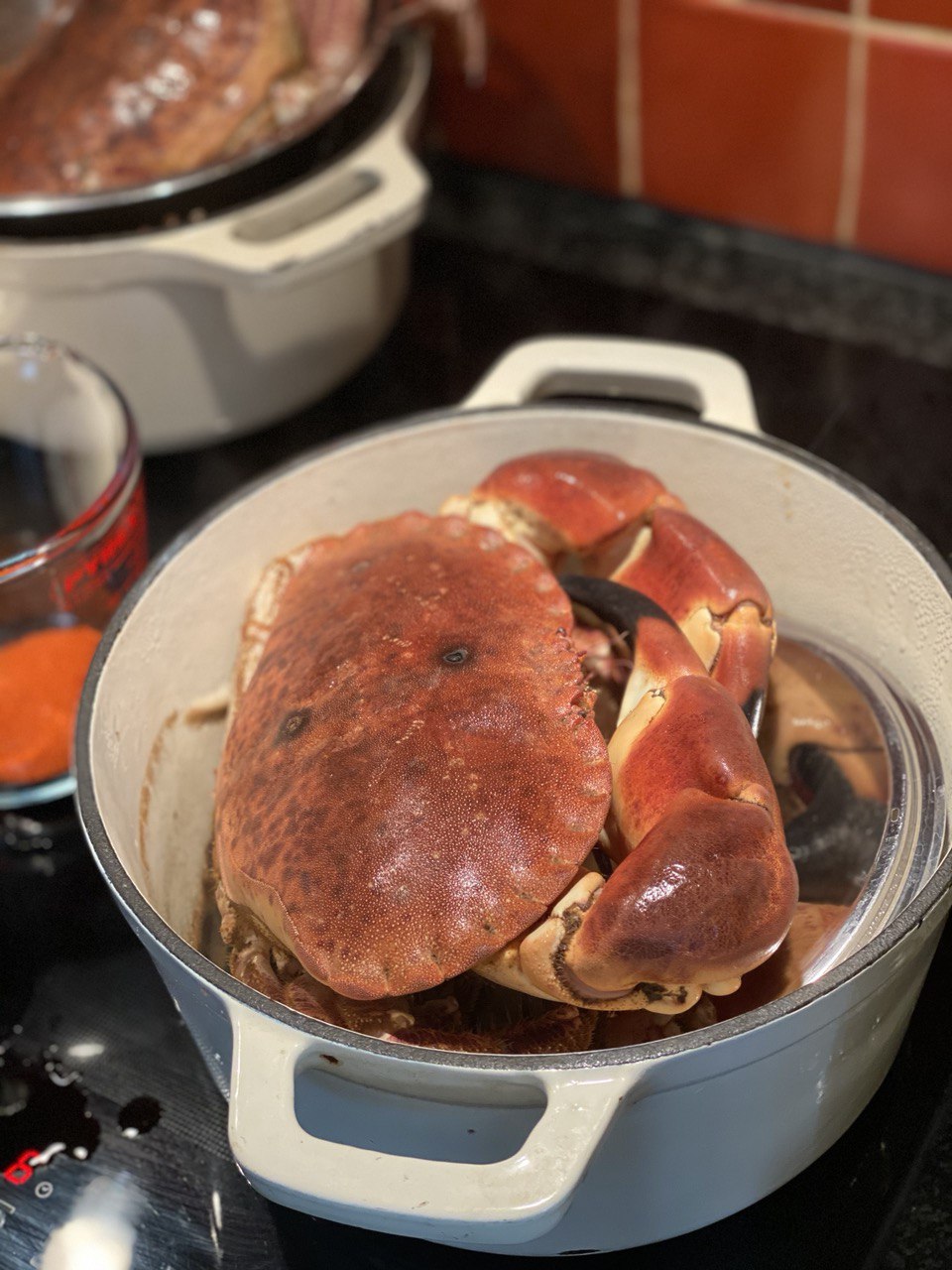
Learnt the hard way that large pots worth investment, and then spent an hour trying to dispatch it into pieces.
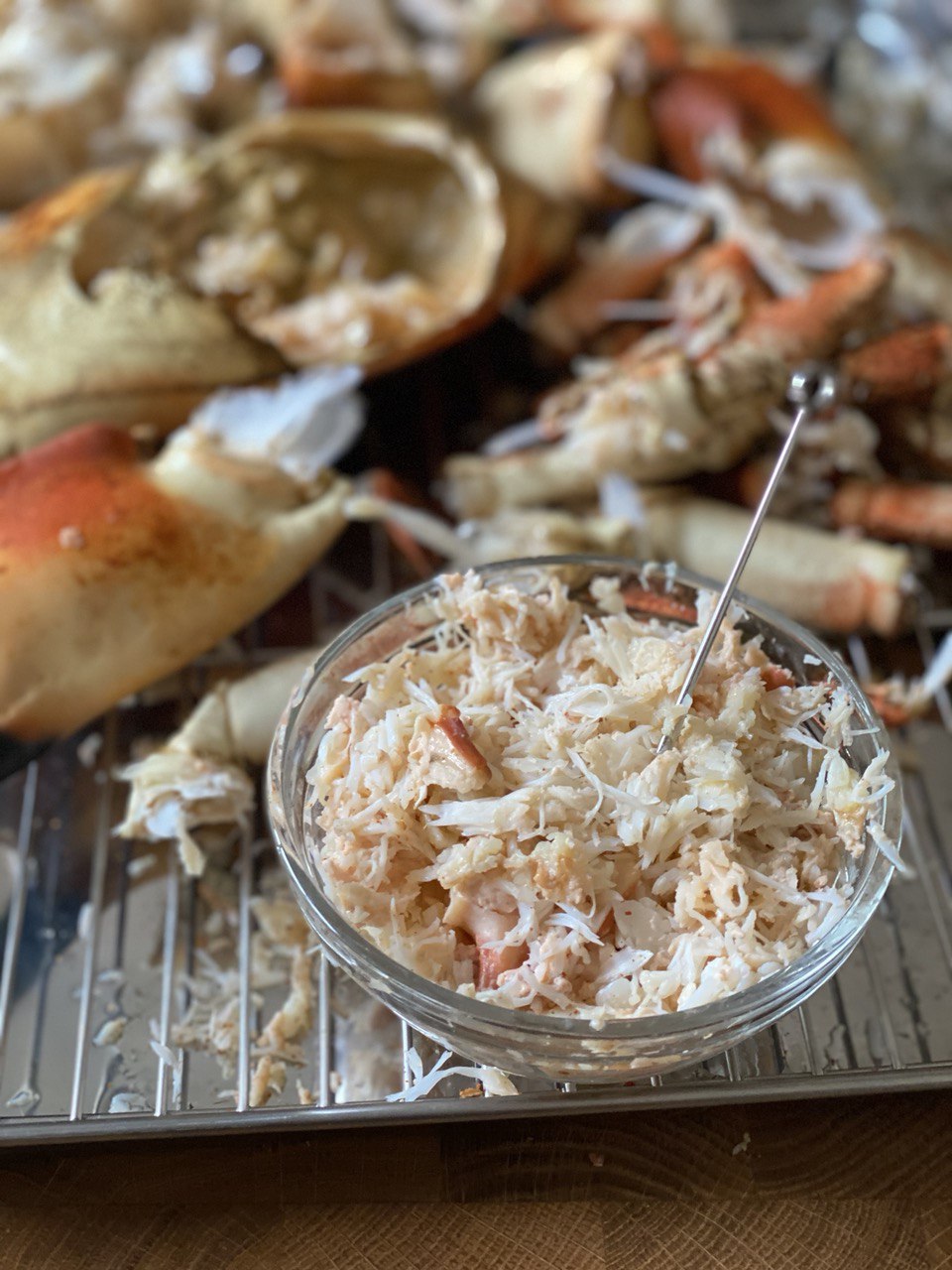
Delicious anyway. The leftovers were turned into crab stock and crab butter.
Salmon ¶
One of the easiest things to cook out there, so more of a nice exercise at filleting:
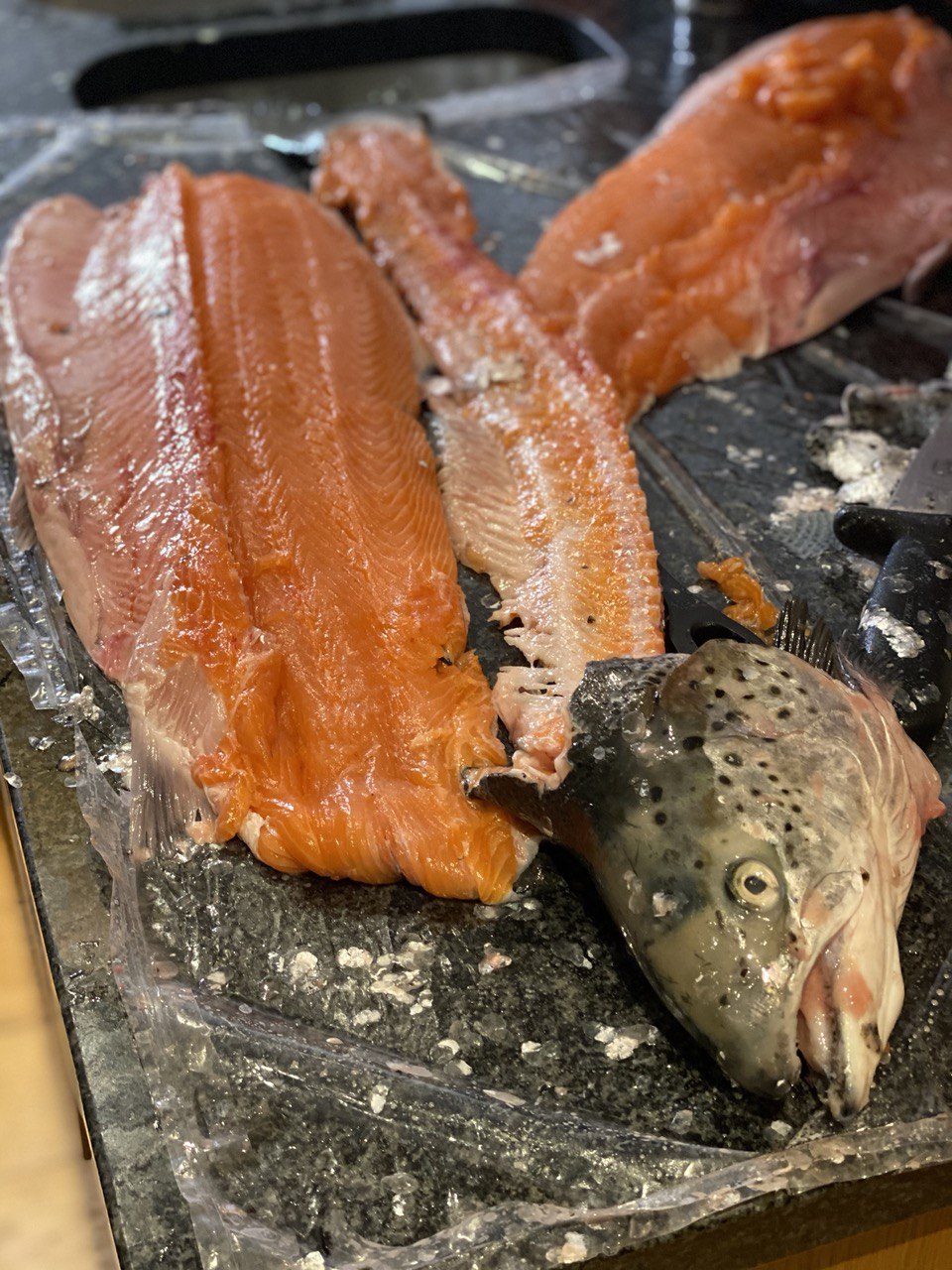
We had a few of these beauties, so fillet was cured for a few days following my favourite gravlax recipe, but this time with scotch, not aquavit.
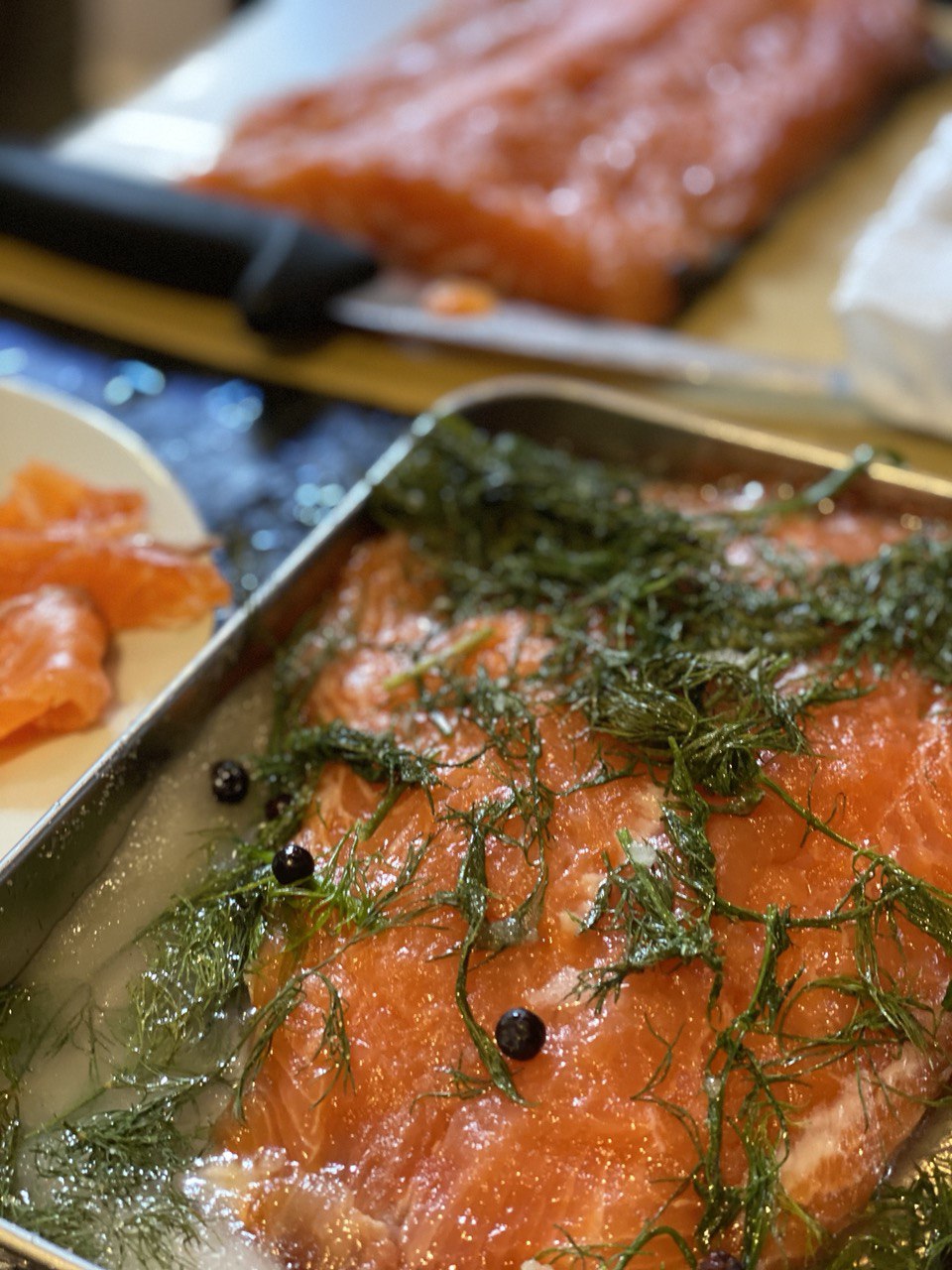
And then partly hot smoked with some honey:
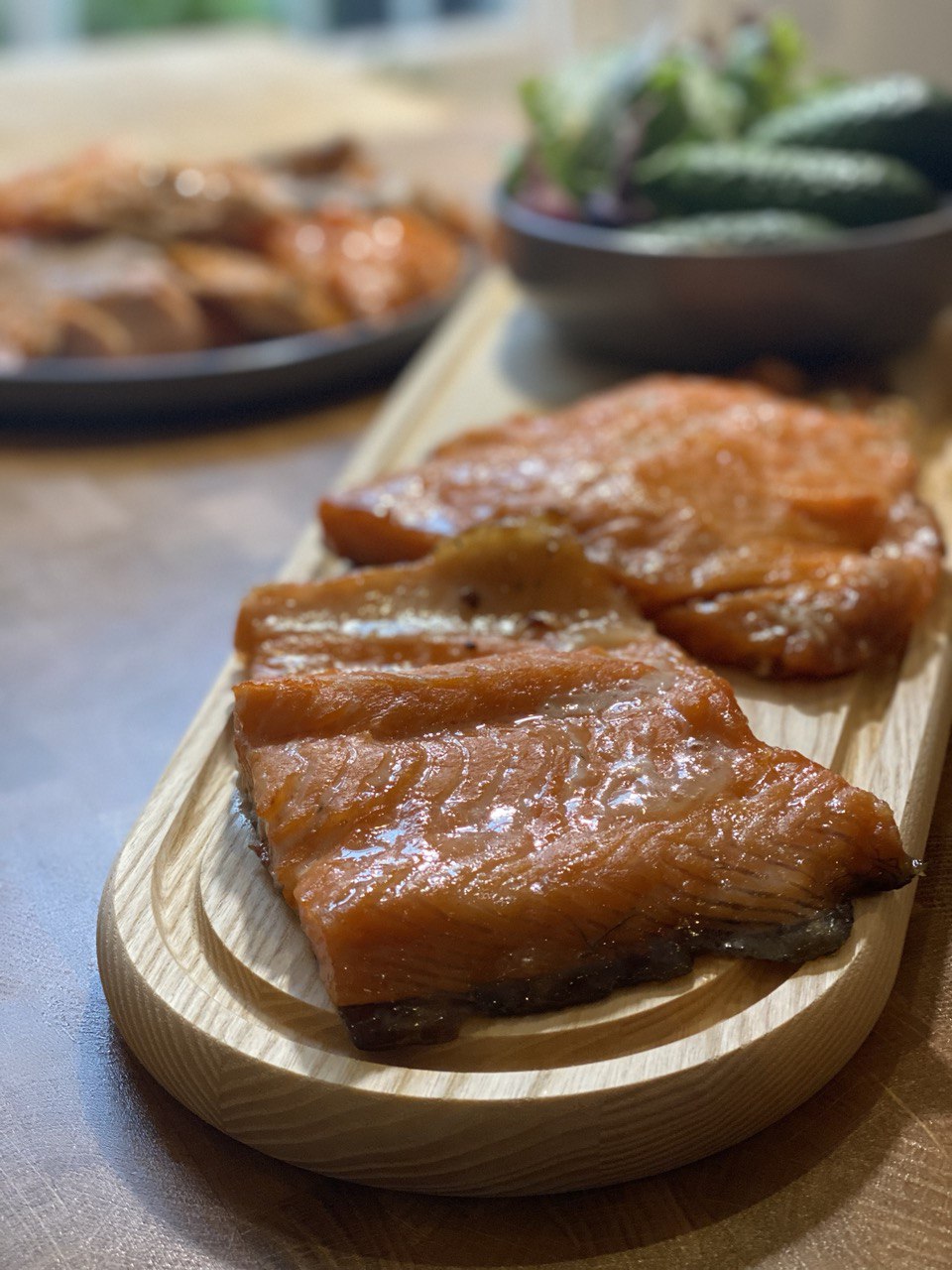
Roe ¶
A grey mullet had some sacks of roe, which is pretty cool:

I separated it from the film, cleaned, and then mixed with salt and sugar:
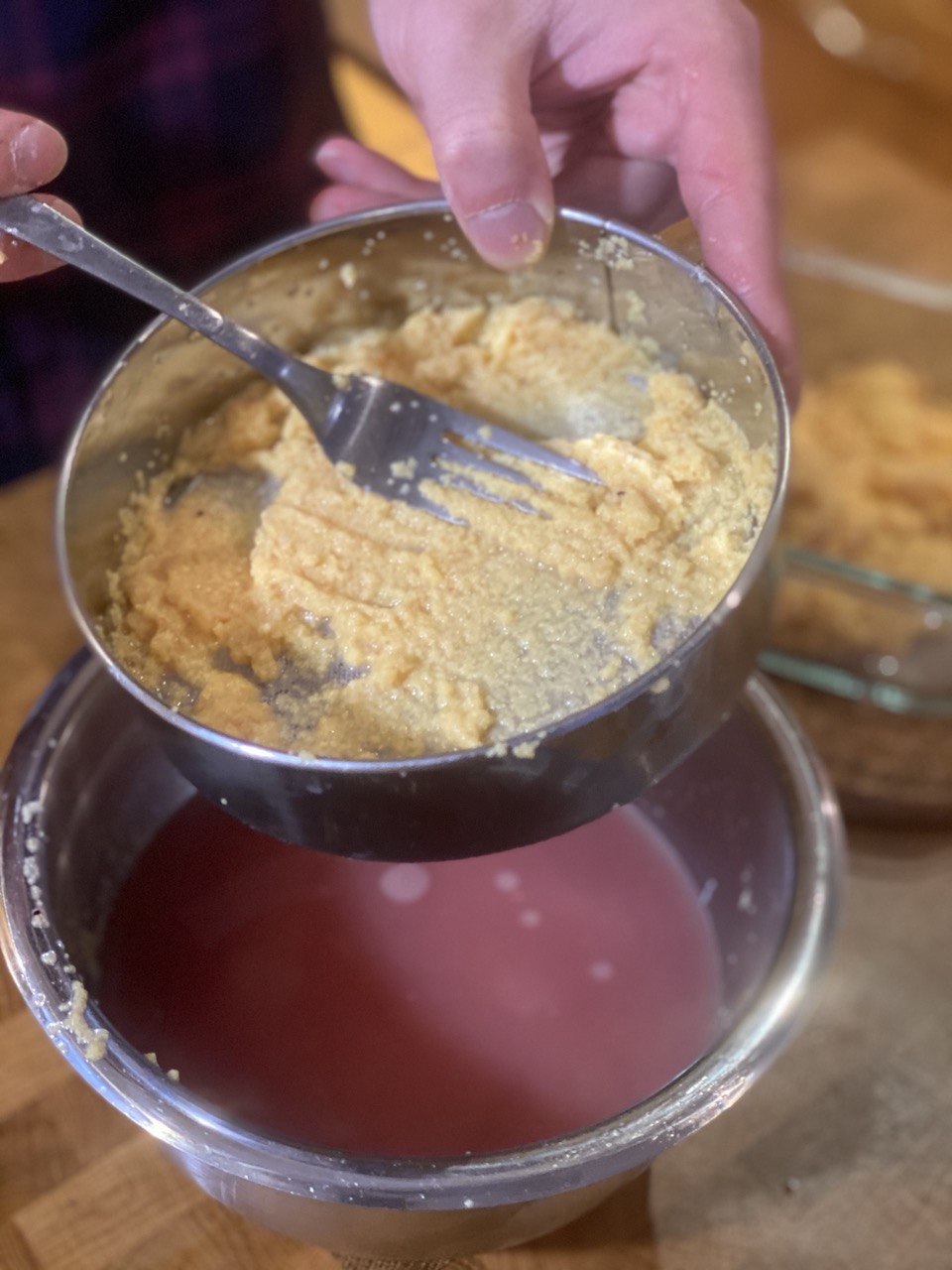
Fast-forward six hours, and here it is:

Pizza ¶
We've used leftovers of cured salmon, crab meat, and roe on a pizza baked in a wooden oven, with a base of ricotta cheese sauce and some fresh dill sprinkled on top.

There was also three types of rainbow trout grilled with Romanesco, and next time I will try to do some sprats smoked in olive oil, and optionally grill an octopus.
Only if British weather will get back to normal (snowing in April is outrageous).
Things I enjoyed reading ¶
1. A tale of two tongues by Stephanie Tam ¶
A spectacular way to compare two very different languages, both destined to become international.
When it came to sheer numbers of speakers, English in the 1800s was nowhere near the most widely spoken language, nor even the one with the greatest prestige in Europe. French remained the primary language of diplomacy. It would take another century, two world wars, and the rise of another global power for English to truly achieve the linguistic hegemony it has today.
I never enjoyed reading or speaking esperanto, despite numerous attempts at learning it, as I was mesmerised by the idea of an artificially created language without exceptions and with a clear mathematical logic.
However, years later I've realised that Hebrew pretty much ticks all boxes too, and yet doesn't feel so artificial, so never looked back again.
2. What a Tiny Masterpiece Reveals About Power and Beauty by @jsf ¶
This is a new interactive masterpiece of modern journalism, this time focues around a painting of an emperor.
A painting like this would also have been the product of many hands. Chitarman would have designed the composition, selected the colors; then apprentices did the painstaking work, with fine brushes of squirrel hair.
These are the moments when I understand why people come to museams with guides and spend hours in front of a single picture.
3. I thought I was dying: My apartment was built on toxic waste by Ashley Gjovik ¶
A-pretty-much-detective-story of someone coping with unusual symptoms which started after moving to a new place.
I spent the next few days buying more air quality monitors for additional data points, all of which showed high levels of tVOCs, rising and falling. I contacted my property manager, Irvine Company, about my concerns. Irvine Company knew I had been sick and was also helping me investigate the “earthquakes.”
I also do feel the urge to get some proper air quality monitors now.
4. The SwiftUI Experiment by @a_grebenyuk ¶
This is a very well-written post on trying out SwiftUI for a few months as the tool for a production-ready app, with some helpful insights on building it across all platforms.
This experiment proved, to me at least, that you can build production-ready apps using SwiftUI. Pulse performs well. It reuses a lot of code but is optimized for each platform. It has a ton of powerful features: deep-links, document-based apps, databases, powerful search, and filters. But if you decide to use SwiftUI, proceed with caution. It’s the second mouse that gets the cheese. You’ll still be the first mouse.
I pretty much second the summary; it's rather convenient at times, and yet there are bits and pieces that make you regret not sticking to a good old storyboard at the very beginning.
5. On “getting” poetry by Adam Kirsch ¶
Growing up among (mostly Soviet) classic literature I might be terribly biased, by despite poetry being out of fashion (at least it seems so) it is well worth investing. However, the author argues that it might not be the case anymore, unless something is done to train the "taste buds" of the modern generation:
But like many adult pleasures, poetry is an acquired taste. We don’t grow up surrounded by it, the way we do with pop music and movies, whose conventions become second nature. Rather, poetry is to our usual ways of reading and writing as classical music is to pop, or as ballet is to dancing at parties. The medium is the same—language, sound, and movement, respectively—but the conventions and values are very different and require some effort to get used to.
6. Matthew Walker's "Why We Sleep" Is Riddled with Scientific and Factual Errors by @alexeyguzey ¶
That's a great way to review a book! From covering only the first chapter to show how ridiculous it is, to citing more resources to prove points than the book itself.
One might wonder why he cited a documentary film from National Geographic, rather than the WHO directly, but ok, maybe that film has a reference to the primary source. I watched the entire 88-minute long film twice to make sure I didn’t miss anything and the film never mentions the WHO or any sleep loss epidemics declared by the WHO and never features anyone from the WHO.
I happened to start reading the book in question a few years ago but never finished it. Seems like that was a good decision.
7. Writing tools I learned from The Economist by Ahmed Soliman ¶
I can only imagine learning a language from newspapers; learning it from articles in The Economist must be even harder, but seems like that was the case here:
Writing to be understood might be an obvious requirement of a readable article, but often I find myself occupied with deciphering form instead of digesting content. Not so with the British newspaper: its writers understand that form exists only to serve content. It’s okay to internally admire one’s word choices and sentence structures, but writers should be a little less selfish in their writing, especially nonfiction.
Maybe now is the time to subscribe to a printed version and once a week read through it with a morning shot of espresso? We will see.
8. Breaking GitHub Private Pages for $35k by @NotDeGhost ¶
Here is a really inspiring story of taking up on a challenge, but also a great way to show the flows in one's architecture design process in a seamingly legit scenario:
This happens when a private page repository is changed to public. This scenario is quite plausible. For example, an organization might initially create a private repository with a corresponding private page. Later on, the organization might decide to open source the project, changing the repository status to public.
A great start for 2021 too.
9. Cracking the Case of London’s Elusive, Acrobatic Rare-Book Thieves by Marc Wortman ¶
I won't be surprised if this article is already used as a plot for some Netflix movie, because it should be so-so good.
Scotland Yard’s Ward was stunned. He couldn’t recall a burglary like this anywhere. The thieves, as if undertaking a special-ops raid, had climbed up the sheer face of the building. From there, they scaled its pitched metal roof on a cold, wet night, cut open a fiberglass skylight, and descended inside—without tripping alarms or getting picked up by cameras. “Dangerous work,” he says. “This is not something ordinary burglars try to accomplish.”
It also ends really well (although not for the thieves, for books).
10. The Daily Standup is a Waste of Time by @ternarywat ¶
My morning routine includes 60 seconds where I remind the rest of the team about the awesome job I did yesteday and fascinating thing I am going to build today.
Seems like it doesn't change much, though.
I don’t remember most updates I’ve heard in a daily standup. This leads me to ask follow-up questions with my team. My colleagues then have to repeat the information they said in the daily standup. The only difference is that now I’m listening.
On the other side I do enjoy these brief moments as sometimes that's the only time during the day when I see my colleagues.
Things I didn't know last Tuesday ¶
1. London Necropolis railway station ¶
Out of all Tube lines there was a very grim one, going to a Necropolis outside of the city.
London Necropolis railway station was the Waterloo, London terminus of the London Necropolis Railway. The London Necropolis Railway was opened in 1854 as a reaction to severe overcrowding in London's existing graveyards and cemeteries.

Some Lovecraftian vibes here indeed.
2. Grasshoppers are older than grass ¶
I've been munching on freshly roasted grasshoppers a few days ago just to find out that they were hopping around way before grass.
They are among what is probably the most ancient living group of chewing herbivorous insects, dating back to the early Triassic around 250 million years ago.
Does it mean grass was actually named after them?...
3. Pastiera ¶
If you want to have a proper Easter cake for the upcoming Orthodox holiday, here is one:
Pastiera Neapolitan is a type of Neapolitan tart made with cooked wheat, eggs, ricotta cheese, and flavoured with orange flower water. It is usually eaten at Easter.
Although if you happen to look up the recipe just night before the event, you better pray to find some cooked wheat in the pantry. Apparently it won't work otherwise.
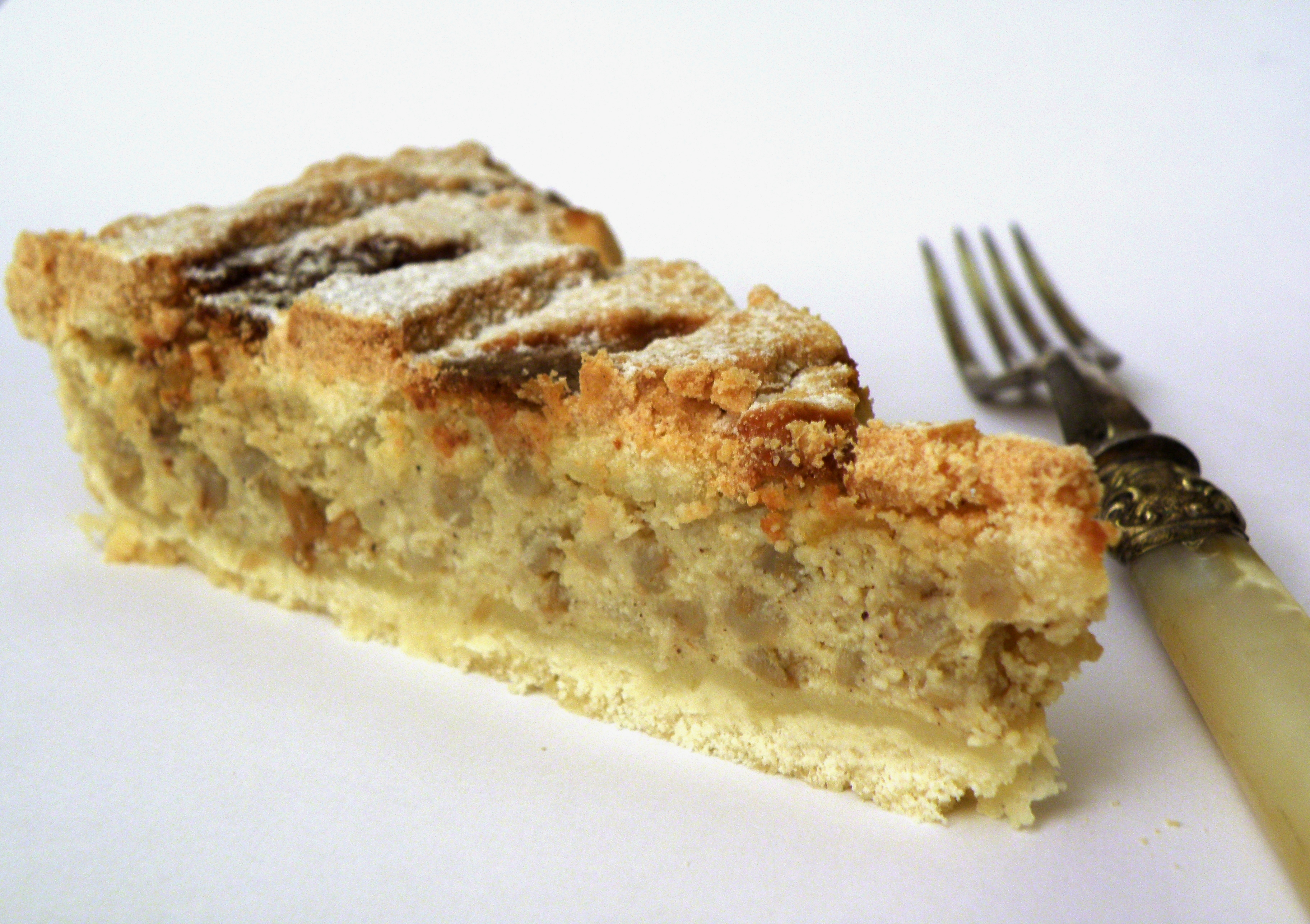
4. Star-shaped sand ¶
There are beaches where sand grains are actually shells of fossils that are star-shaped.
When Foraminifera die, their shells remain in the sea and the tide brings them ashore. In the case of Hatoma, Iriomote and Taketomi islands in Okinawa, this results in beaches sprinkled with star sand.
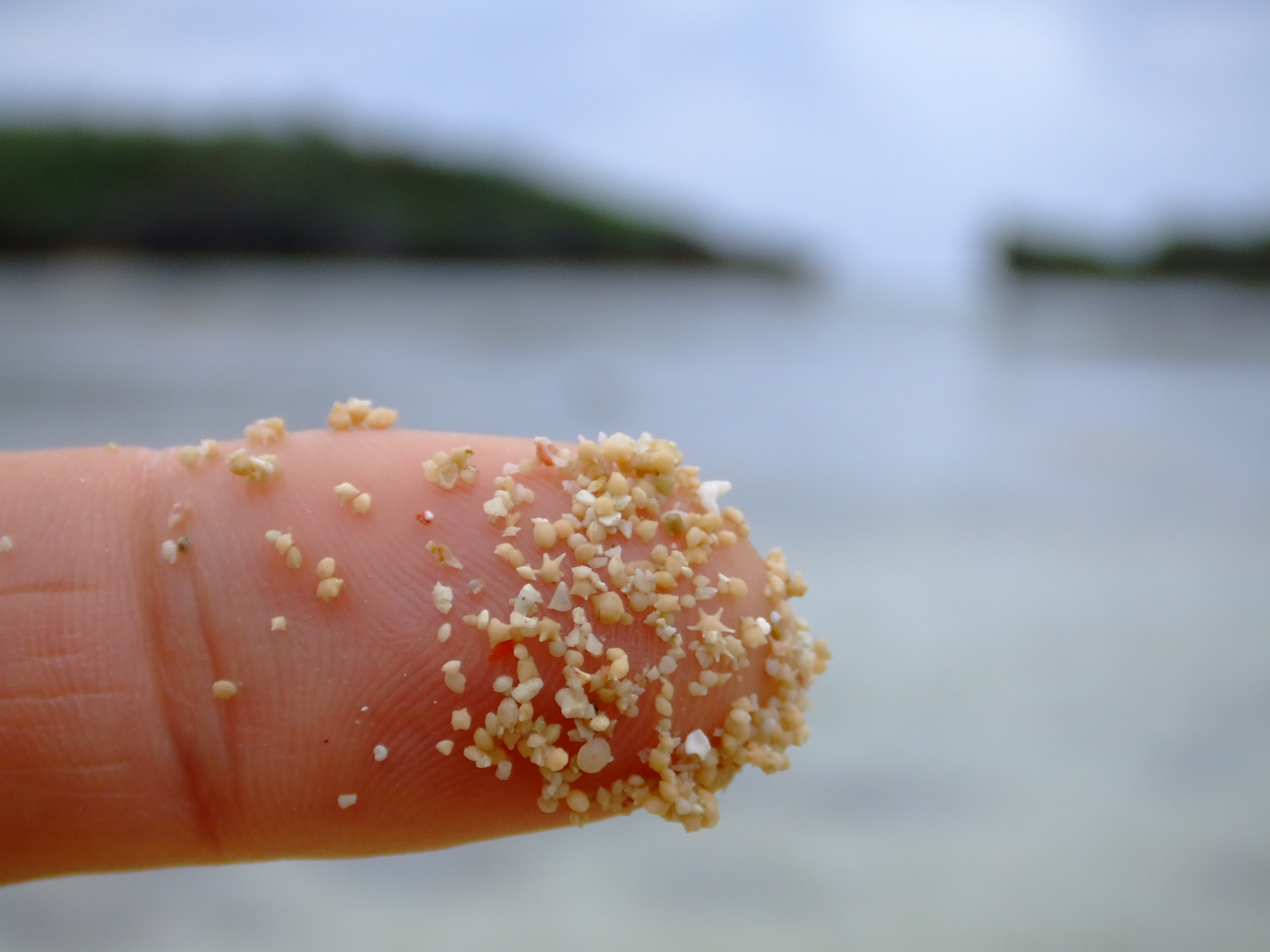
5. Isoamyl acetate ¶

There is a compound used to replicate banana flavours, and also due to its intense but pleasant odor it is used to test gas masks.
Isoamyl acetate has a strong odor which is described as similar to both banana and pear.
Apparently it is also released by a honey bee's sting apparatus where it serves as a pheromone beacon to attract other bees and provoke them to sting, so beekeepers try to avoid eating bananas upon working with bees.
6. F-11 ¶
Can't imagine one's surprise:
The test pilot had assumed he had been the victim of a bird strike, but the accident investigation revealed another cause: In his fast descent, the pilot had actually flown into his own stream of 20-millimeter cannon rounds.

7. Simpsons' creator's family ¶
Matt Groening named the Simpsons after members of his own Portland family (or Portland streets).
His parents are Marge and Homer, and sisters are Lisa, Maggie and Patty.
As the voice on the phone suggests, the real-life Marge, Homer, Lisa, Maggie and Patty hardly resemble their yellow, bobble-eyed alter egos. But the Simpsons-loving public doesn’t always get what Ned Flanders might call “reality-iddly.” With their names planted deep in pop culture, the Groenings have found themselves living with a sort of bizarro celebrity status.
That must be one very friendly family I reckon.
8. Canusa Street ¶
As far as I know, this is the only one place on the US-Canada border where the border splits a city in halfs, and crossing the road means reporting to a border control officer.
Local legend claims that a group of rather drunken surveyors, when given the task of determining the United States–Canada border line in the region (nominally at 45.00°N), decided to place the border right through the center of the village along what is now Canusa Street.

9. Punt e Mes history ¶
There is a beautiful story behind the origins of this splendid vermouth:
Turin was then the Italian capital and The Carpano bar was frequented by customers from the nearby Turin Stock Exchange. At the end of a particular day's trading, when some key stocks had just fallen by one and a half points and the bar was full of traders, a businessman ordered a particular style of bitter-sweet vermouth in Piadmontese dialect: 'Ca-m dag-n punt e mes' ('Give me a point and a half').
So that literally meant adding half a measure of a bitter (.5) to a vermouth. Makes sense now.
10. Supplicia canum ¶
In the Ancient Rome, there was an annual sacrifice of dogs, while geese were watching this dressed in gold:
Ancient sources who explain the origin of the supplicia say that the geese were honored for saving the city during the Gallic siege of Rome. When the Gauls launched a nocturnal assault by stealth on the citadel, the geese raised a noisy alarm. The failure of the watch dogs to bark was thereafter ritually punished each year.
Right, fair enough. So glad they didn't have Instagram back then though.
Book of the week ¶
I really enjoyed reading this book's review / summary not so long ago, so ended up picking it up just for the sake of wrapping the topic up, and guess what?
It's lovely.
And while John McWhorter covers mostly English as a language, his Our Magnificent Bastard Tongue also touches up on some other complex grammars:
Right — take Russia. All would agree that certain changes have occurred in prevailing beliefs in that country over the past thousand years—from brute feudalism under the tsars to Communism to glasnost to the queer blend of democracy and dictatorship of today. Yet Russian grammar during that time has always been the marvelous nightmare that it is now. Russian has changed, to be sure, but without equivalents to the Celtic adoption and the Viking disruption, and nowhere near as dramatically as English—and in no ways that could be correlated with things Peter the Great, the Romanovs, or Lenin did.
Its style somehow reminds me of books on the same topic by Harry Ritchie and Truss Lynne, but this one definitely goes deeper in time.
Thank you and see you in a week! ¶
If you have any questions, or want to suggest a link for the next newsletter, please drop me a message on Twitter or reply to this email.
Cheers! 🍸